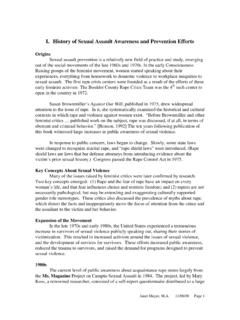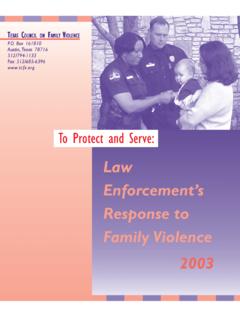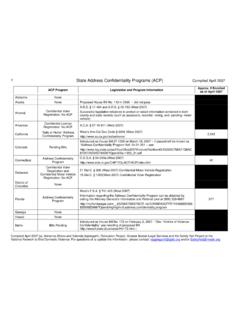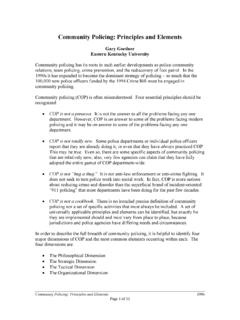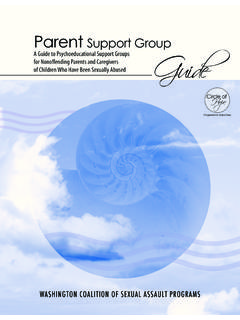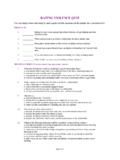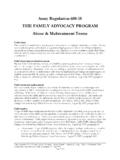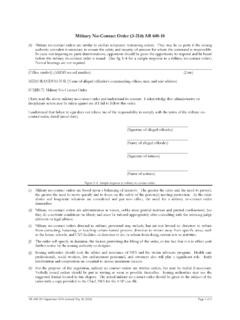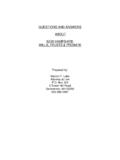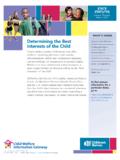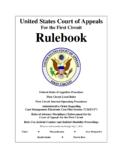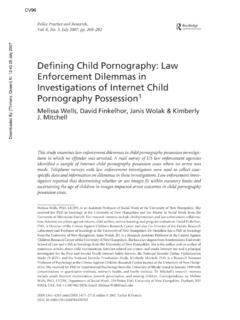Transcription of State of NH v. Steven Kidder - National Center on Domestic ...
1 State of New hampshire v. Steven Kidder Page 1 of 5 State OF NEW hampshire v. Steven Kidder No. 2003-362 SUPREME COURT OF NEW hampshire 150 600; 843 312; 2004 LEXIS 37 January 14, 2004, Argued February 27, 2004, Opinion Issued SUBSEQUENT HISTORY: [**1] Released for Publication March 24, 2004. PRIOR HISTORY: Hillsborough District Court. DISPOSITION: Certified question answered; remanded. CASE SUMMARY PROCEDURAL POSTURE: Defendant filed a motion in the Hillsborough District Court (New hampshire ) to dismiss a complaint filed against him alleging that he violated a temporary protective order by having his attorney contact the victim. The trial court certified a question to the New hampshire Supreme Court pursuant to Sup. Ct. R. 9 as to whether contact of the victim by a defendant s attorney constituted a violation of a temporary protective order. OVERVIEW: The State argued that defendant violated the protective order by contacting the victim through his attorney.
2 The State s highest court agreed. Holding a defendant criminally responsible for knowingly contacting the victim through his attorney effectuated the intent of the legislature in enacting Rev. Stat. Ann. ch. 173-B. There was no legislative intent to except legitimate contact by certain third parties from Rev. Stat. Ann. ch. 173-B, and precluding contact by legitimate parties did not render ch. 173-B unconstitutionally overbroad. The State s highest court refused to create a legitimate purpose exception to the contact prohibited by a protective order. The interpretation also did not deprive a defendant of his effective assistance of counsel or due process rights as the New hampshire and United states Constitutions did not confer upon a defendant unfettered access to witnesses, especially Domestic violence victims with protective orders. Finally, neither a defendant, the victim, nor either party s representative had the authority to approve exceptions.
3 If a defendant had a legitimate reason to contact the victim, he could seek an exception from the trial court. OUTCOME: The certified question was answered in the positive. The case was remanded to the trial court. COUNSEL: Peter W. Heed, attorney general (Stephen D. Fuller, senior assistant attorney general, on the brief and orally), for the State . Christopher M. Johnson, chief appellate defender, of Concord, and Landya McCafferty, assistant appellate defender, of Dover (Ms. McCafferty on the brief, and Mr. Johnson orally), for the defendant. JUDGES: NADEAU, J. DALIANIS and DUGGAN, JJ., concurred. OPINION BY: NADEAU State of New hampshire v. Steven Kidder Page 2 of 5 OPINION: [*601] [**314] NADEAU, J. The Hillsborough District Court (Hatfield, J.) certified the following question pursuant to Supreme Court Rule 9: Does the defendant in this case, who is subject to a protective order issued by the District Court which prohibits third party contact with the victim by telephone, violate the order when the defendant s attorney, a member of the New hampshire Bar in good standing, contacts the unrepresented protected person on behalf of the defendant?
4 For the reasons explained below, we answer this question affirmatively and remand. The district court, following [**2] offers of proof and submission of various memoranda and pleadings, made the following findings of fact for the purpose of deciding this motion to dismiss. On January 21, 2003, the Manchester District Court (Lyons, J.) issued a temporary protective order against the defendant, Steven Kidder , in favor of the victim, Dawn Cassidy, who had filed a Domestic violence petition. See RSA ch. 173-B. The protective order, in relevant part, read: The defendant shall not have any contact with the plaintiff, whether in person or through a third party, including, but not limited [to], contact by telephone. The defendant hired attorney Gregory Swope to represent him regarding the Domestic violence matter pending before the district court. The defendant and attorney Swope knew that Cassidy had procured the protective order against the defendant.
5 At the defendant s direction, attorney Swope contacted Cassidy to inform her that he represented the defendant, was calling on his behalf, and wanted to organize a meeting with all three parties present. Following the phone call, Cassidy, who was not represented by counsel, contacted the police, fearing that Swope and [*602] the defendant would talk her out of pursuing the Domestic violence matter. [**3] As a result, the State filed a class A misdemeanor complaint against the defendant alleging that he did knowingly violate a Temporary Protective Order .. in that [he] did establish third party contact with .. Cassidy, by having Gregory Swope contact her regarding the said protective order. Swope filed a motion to dismiss the complaint and the State opposed the motion. Because this case concerns unresolved issues of New hampshire law, the district court certified the question to this court.
6 [**315] The defendant argues that interpreting the provisions of RSA chapter 173-B to prohibit all third-party contact, including through an attorney, would lead to an absurd result. Specifically, he contends that imposing criminal penalties on a defendant for the legitimate actions of a third party such as a teacher or doctor, would lead to an absurd result and fails to further the purpose of the statute. The State contends that under the plain language of the statute, the defendant may properly be found guilty of violating a protective order if he knowingly contacts the victim through his attorney. We agree. HN1In matters of statutory interpretation, we are the final arbiter of legislative [**4] intent as expressed in the words of the statute considered as a whole. In the Matter of Watterworth & Watterworth, 149 442, 445, 821 1107 (2003). We first examine the language of the statute and ascribe the plain and ordinary meanings to the words used.
7 Id. Furthermore, we interpret statutes in the context of the overall statutory scheme and not in isolation. Id. Our goal State of New hampshire v. Steven Kidder Page 3 of 5 is to apply statutes in light of the legislature s intent in enacting them and in light of the policy sought to be advanced by the entire statutory scheme. Fichtner v. Pittsley, 146 512, 514, 774 1239 (2001) (quotation and citation omitted). RSA 173-B:4, I (2002), entitled Temporary Relief, provides, in pertinent part, that HN2 upon a showing of an immediate and present danger of abuse, the court may enter temporary orders to protect the plaintiff with or without actual notice to the defendant. HN3 The court issuing the order may afford relief, including, but not limited to, restraining the defendant from contacting the plaintiff. RSA 173-B:4, I(a)(6) (2002). "Contact" is defined as HN4 any action to [**5] communicate with another either directly or indirectly, including, but not limited to, using any form of electronic communication, leaving items, or causing another to communicate in such fashion.
8 RSA 173-B:1, IV (2002). HN5 Knowingly violating a protective order issued under RSA chapter 173-B constitutes a class A misdemeanor. RSA 173-B:9, III (Supp. 2002). As defined in the Criminal Code, HN6 A person acts knowingly with respect to conduct or to a circumstance that is a material [*603] element of an offense when he is aware that his conduct is of such nature or that such circumstances exist. RSA 626:2, II(b) (1996). HN7 The legislative history reveals that the legislature intended RSA chapter 173-B to be construed liberally. See Jour. 649 (1999). It is the public policy of this State to prevent and deter Domestic violence through equal enforcement of the criminal laws and the provision of judicial relief for Domestic violence victims. Id. at 648. A broad interpretation of the statute comports with the legislative purpose to preserve and protect the safety of the family unit for all family or household [**6] members by entitling victims of Domestic violence to immediate and effective police protection and judicial relief.
9 Id. at 649. We find that HN8 holding the defendant criminally responsible for knowingly contacting the holder of a protective order through his attorney effectuates this intent. Nothing in the plain language of the statute or the legislative history indicates a legislative intent to except legitimate contact by certain third parties. We hold that a trier of fact can find that the defendant violated the protective order if the trier of fact finds that the defendant knowingly contacted the unrepresented protected person through his attorney. We caution, however, that HN9 while the defendant may properly be found guilty of violating a protective order when he knowingly [**316] contacts the victim through an attorney, teacher, doctor or other party, prosecutorial discretion should be exercised to distinguish between cases when a third party makes innocent contact with the protected party and those where the defendant uses a third party as a conduit.
10 The defendant argues the State s interpretation of RSA chapter 173-B renders it unconstitutional on its face and as applied, and [**7] therefore the State s interpretation should be rejected. We disagree. First, the defendant contends that the State s interpretation of RSA chapter 173-B is unconstitutionally overbroad. He argues it should not be construed to prohibit legitimate contact without a purpose to harass, intimidate, or otherwise abuse the complainant. To further this argument, the defendant cites RSA 633:3-a, II(a) (Supp. 2003) as an example of a legitimate purpose exception explicitly carved out by the legislature, and State v. Albers, 113 132, 303 197 (1973), and State v. Smith, 127 433, 503 774 (1985), as examples of statutes State of New hampshire v. Steven Kidder Page 4 of 5 that we have construed to avoid conflict with constitutional rights. All of these examples are distinguishable.
